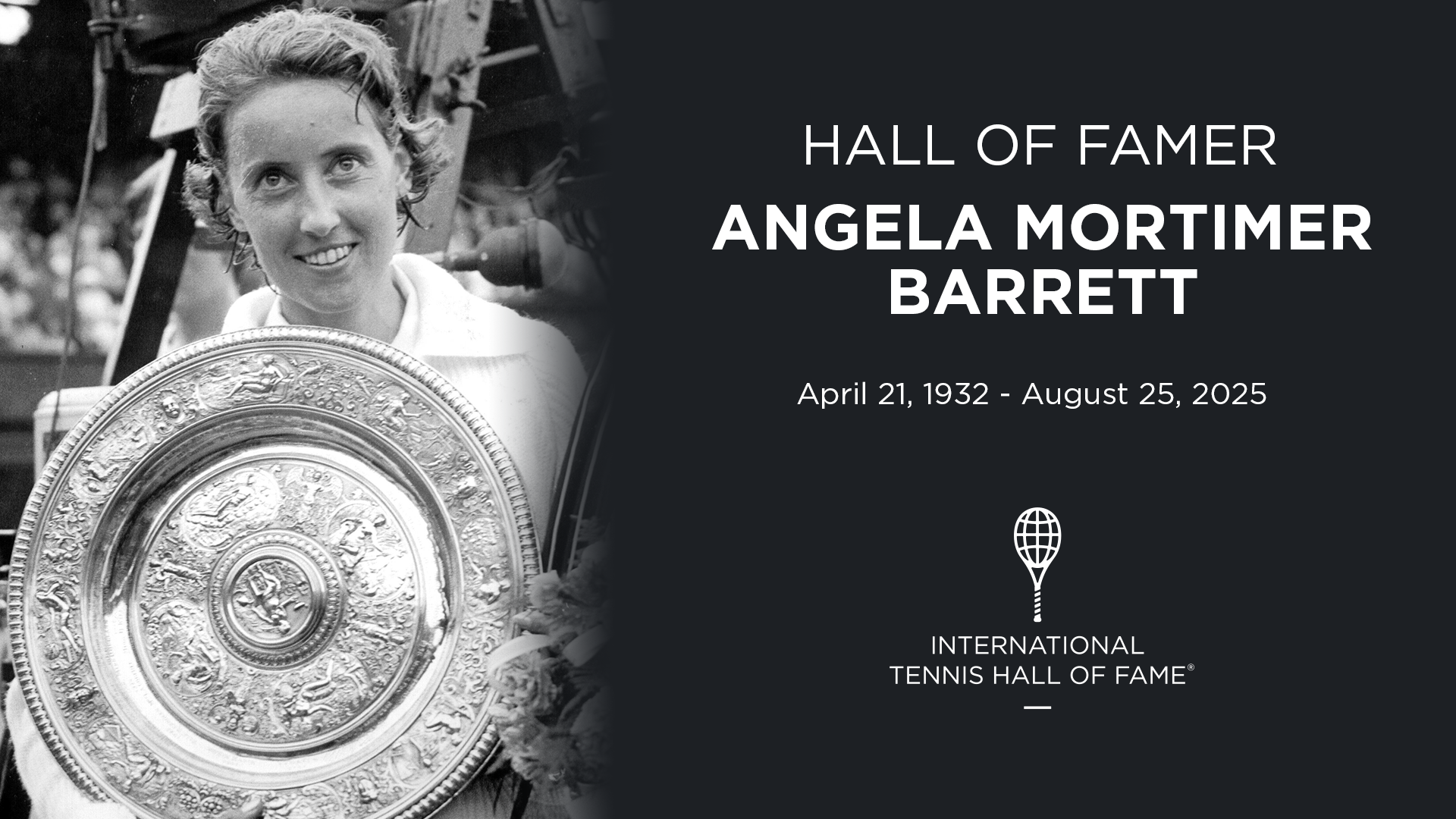In Memoriam: Hall of Famer Angela Mortimer Barrett
By Hall of Famer Steve Flink
Hall of Famer Angela Mortimer Barrett, a resolute Englishwoman who capped her career by winning Wimbledon in 1961 and was also victorious at the Australian and French Championships in the 1950’s, died on Monday at age 93 in Great Britain. In addition to her three major singles titles, Mortimer Barrett was also a doubles champion at Wimbledon. Her Hall of Fame career was notably built while overcoming great adversity, as she was partially deaf.
In 1961, Mortimer Barrett was seeded seventh at the All England Club, while competing at Wimbledon for the eleventh time. Three years earlier, she had reached the final before losing to defending champion Althea Gibson. This time, at 29, she sensed an opportunity that might never come again, as she moved past top seeded Sandra Reynolds of South Africa in a hard fought 11–9, 6-3 semifinal battle. Facing countrywoman Christine Truman in the first all-British female final round duel since 1914, Mortimer Barrett found herself in a tumultuous confrontation against an immensely popular player who had become a crowd favorite with her audacious backcourt game featuring a crackling forehand.
Mortimer Barrett, however, was a tenacious competitor who was imperturbable in the tightest corners of a hard-fought contest. After a series of momentum shifts in the final set, Mortimer Barrett was the victor over Truman in what would be the most memorable and important match of her life.
Mortimer Barrett performed on that occasion with the same hearing hindrance that she dealt with so commendably through most of her career. She said later, “I could hear the applause of the crowd but not much else. I think it helped me to concentrate in my matches, shutting out distractions. When I hear players say they have to hear the ball, I smile. I couldn’t.”
Angela Margaret Mortimer Barrett was born on April 21, 1932 in Plymouth, United Kingdom. The fact that she was partially deaf across so many seasons makes her lofty accomplishments all the more remarkable.
She did not take up the game until she was 15, working under the watchful eye of esteemed coach Arthur Roberts on fast indoor wood courts at the Palace Hotel in Torquay. By the start of her twenties, Mortimer Barrett was making considerable strides, reaching her first quarterfinal at Wimbledon in 1953.
Two years later, Mortimer Barrett took the her first of her major titles. She secured the singles title at the French Championships on clay courts at Roland-Garros in Paris after succeeding in one of the closest women’s major finals ever contested. Mortimer Barrett collided with the American Dorothy Head Knode in the 1955 title round duel, conceding the first set handily. But she rallied valiantly to prevail 2-6, 7-5, 10-8. It was the most debilitating big match she would ever play but as psychically rewarding a victory as she would ever savor. Mortimer Barrett demonstrated on that large occasion that her strongest virtues were the reliability of her ground strokes, the depth of her determination, and her poise under pressure. The following year, Mortimer made it back to the final in Paris, losing to Althea Gibson 6-0, 12-10.
At the 1958 Australian Championships in Sydney, making her lone appearance at that event, she defeated the home country’s Lorraine Coghlan 6-3, 6-4 to claim the title in style. She was also a women’s doubles and mixed doubles finalist at that tournament.
As she moved through her twenties, Mortimer Barrett was making inroads as a match player and gaining confidence as a front-line competitor. She was known for her powers of concentration, astounding ball control, and a determination to never beat herself. It was difficult for an opponent to find any holes in her game.
Having attained the No. 1 world ranking in 1961 according to most authorities, she remained among the top ten the following year, but then stopped competing. She became captain of the British Wightman Cup team that she had spearheaded so many times as a player, serving in that capacity from 1964-70. She also held the distinction of being the Federation Cup (now Billie Jean King Cup) captain as well in that period.
In 1993, 32 years after her most significant triumph as a player, she was inducted into the International Tennis Hall of Fame.
On April 3, 1967, Florence Angela Margaret Mortimer married John Barrett, a former British player who later became “the voice of Wimbledon” as a BBC commentator for 35 years commencing in the early 1970’s. After her tennis career, she turned to motherhood, raising two children with Barrett, and residing a “stone’s throw” from Wimbledon where they both found prominence on and off the court.
John Barrett was inducted into the International Tennis Hall of Fame in recognition for his contributions to the sport in 2014. His induction made Mortimer Barrett and Barrett become the second husband-wife duo ever to be elected to the International Tennis Hall of Fame after Stefanie Graf (2004) and Andre Agassi (2009).
She is survived by her husband John, and their children Michael and Sarah Jane.


